
Volume XVI, Issue II
Apollonius
By Bob Kirchman
Copyright © 2019, The Kirchman Studio, all rights reserved
Chapter 2: The Great Northern
The Starship Great Northern rode in Geosynchronous Earth Orbit at Space Station/Assembly Center 005 of the Alaska Autonimous Republic. Indeed the crafty Apollonius had spun a tale of potential benefits to mankind. Also, he had invoked an odd chapter in England’s history where convicts and other undesirables were sent to colonize the remote island sub-continent of Australia and there they established a great nation. From 1788 to 1868, about 160,000 convicts were sent to penal colonies there. It was the unforeseen second chance that gave many Australians a hope and a future. Zimmerman, for his part was always willing to listen to any alternative to incarceration. His own incarceration in a U.S. Federal Prison weighed heavy upon him… that and the notion that Theodor Herzl had put forth that there could indeed be a society without prisons! Apollonius had opened his checkbook and the project had been accomplished in record time to build an interplanetary star ship. Cape Lisbon International Spaceport, for its part, provided new and unheard of economy and reliability putting men and materials in orbit. And so the ship, capable of carrying fifty souls on the nine month journey to mars orbited ‘at anchor’ at SSAC005. The ship was being stocked with 3D printers and plans for much of the space colony’s needed machinery, which would be created on the planet’s surface. The unmanned probe had already been sent and would confirm the resources were there to construct what the colonists required. The plan was to expand from the initial living pods out into a full-scale biosphere, much resembling the one on Big Diomede, to protect the colonists from the effects of Mars’s thin atmosphere which was mainly CO2. In the Zimmerman Organization offices in Wales, greenhouse designs originally created for the tundra were being reconfigured for use on Mars. The parts were also being redesigned for ‘printing’ in factories on the planet itself. Botanists were collecting and cultivating plants that would refresh the atmosphere even as they provided food for the settlers. “Eventually we’ll need to establish a colony of 40,000 people in order to allow for a healthy and diverse stock.” Apollonius had said. Still, the initial mission was defined by the limitations of budget and practicality.
The Great Northern had a forward section with a rotating centrifugal ring to create the sensation of gravity for the passengers and crew. It was compact but comfortable. Portholes in the compartments offset the claustrophobic compactness. The ship had been assembled from components destined for platform SS/AC006, the next orbital station to be built, and fitted with a fusion engine to become a large space-going vessel. The fusion engine was at the end of a long tube to the rear of the configuration and the bridge sat directly in front of the gravity ring section. At the helm was Captain Abiyah Ben Gurion, a veteran of the Israeli Air Force. A thoughtful man who spoke little, he had been at the top of his class in astronaut training and was given the opportunity to pilot the first mission to Mars. There was to be no forced assignment to this mission by Zimmerman’s decree. Even the ’settlers’ were to be volunteers. On this point he had won over Apollonius’s insistence that the crew be chosen by George himself and ordered on the mission. The result was a tight group of hard-core military personnel as crew and an odd mix of adventure seekers and condemned men and women who did not fit into society in the potential pool of settlers. Zimmerman and Apollonius would oversee the final selection. Captain Ben Gurion was typical of the crewmen, a silent loner who kept to himself but was known for his devotion to his fellow airmen. He was not unlike those seamen of old who captained oceangoing vessels under sail. His passion was music and he earned the nickname ’Nemo’ from the fact that he had a little midi keyboard in his cabin and the strains of his music often spilled out into the passageways. The crew loved it and almost never addressed him as anything but.
Nemo would be a man without a country for the duration of the two-year voyage. It would take about nine months to get there and then require about six months of orbiting the planet in a support capacity to the colony. After that, there would be the long return trip. The plan was to rotate crews each trip but Nemo secretly wished he could stay on for longer. “Not to worry,” he thought to himself. “Distinguish yourself in command and there won’t be many who seek to take it from you.”
(to be continued)

____________________________________________
How and Why Should I Read the Bible?
In Search of Liberty Bell Seven
Gus Grissom's Lost Mercury Capsule
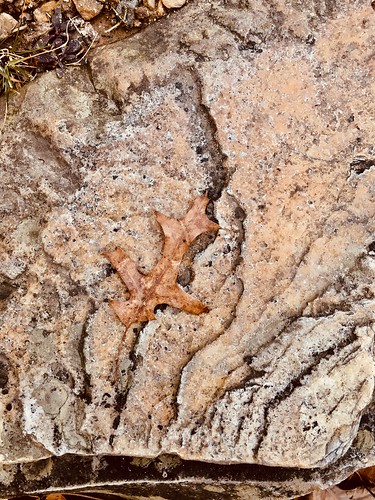
Photo by Bob Kirchman.
C. S. Lewis on Good and Evil
If you do not take the distinction between good and bad very seriously, then it is easy to say that anything you find in this world is a part of God. But, of course, if you think some things really bad, and God really good, then you cannot talk like that. You must believe that God is separate from the world and that some of the things we see in it are contrary to His will. Confronted with a cancer or a slum the Pantheist can say, ‘If you could only see it from the divine point of view, you would realise that this also is God.’ The Christian replies, ‘Don’t talk damned nonsense.’ For Christianity is a fighting religion. It thinks God made the world—that space and time, heat and cold, and all the colours and tastes, and all the animals and vegetables, are things that God ‘made up out of His head’ as a man makes up a story. But it also thinks that a great many things have gone wrong with the world that God made and that God insists, and insists very loudly, on our putting them right again.” – C. S. Lewis in Mere Christianity
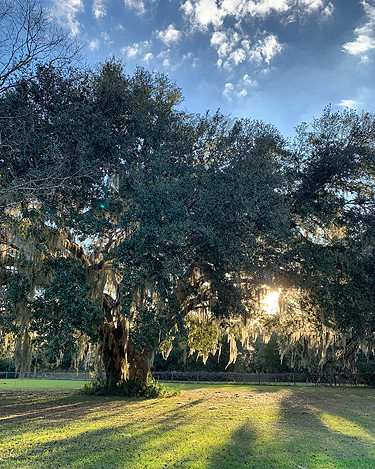
This was taken near sunset this evening at Sunnyhill Restoration Area on the edge of the Ocala National Forest, Umatilla, FL.
Photo by Melissa K. Hand.
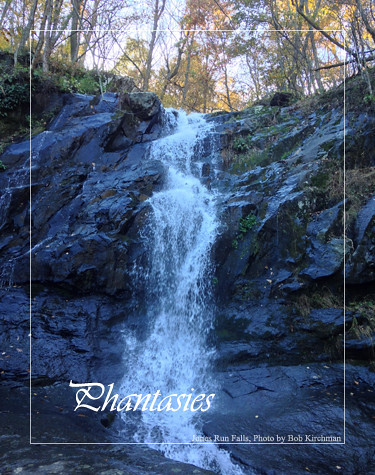
Volume XVI, Issue IIa
Phantasies
By George MacDonald, Chapter 11
A wilderness of building, sinking far
And self-withdrawn into a wondrous depth,
Far sinking into splendour--without end:
Fabric it seemed of diamond and of gold,
With alabaster domes, and silver spires,
And blazing terrace upon terrace, high
Uplifted."
~ William Wordsworth, "Excursion".
But when, after a sleep, which, although dreamless, yet left behind it a sense of past blessedness, I awoke in the full morning, I found, indeed, that the room was still my own; but that it looked abroad upon an unknown landscape of forest and hill and dale on the one side--and on the other, upon the marble court, with the great fountain, the crest of which now flashed glorious in the sun, and cast on the pavement beneath a shower of faint shadows from the waters that fell from it into the marble basin below.
Agreeably to all authentic accounts of the treatment of travellers in Fairy Land, I found by my bedside a complete suit of fresh clothing, just such as I was in the habit of wearing; for, though varied sufficiently from the one removed, it was yet in complete accordance with my tastes. I dressed myself in this, and went out. The whole palace shone like silver in the sun. The marble was partly dull and partly polished; and every pinnacle, dome, and turret ended in a ball, or cone, or cusp of silver. It was like frost-work, and too dazzling, in the sun, for earthly eyes like mine.
I will not attempt to describe the environs, save by saying, that all the pleasures to be found in the most varied and artistic arrangement of wood and river, lawn and wild forest, garden and shrubbery, rocky hill and luxurious vale; in living creatures wild and tame, in gorgeous birds, scattered fountains, little streams, and reedy lakes--all were here. Some parts of the palace itself I shall have occasion to describe more minutely.
For this whole morning I never thought of my demon shadow; and not till the weariness which supervened on delight brought it again to my memory, did I look round to see if it was behind me: it was scarcely discernible. But its presence, however faintly revealed, sent a pang to my heart, for the pain of which, not all the beauties around me could compensate. It was followed, however, by the comforting reflection that, peradventure, I might here find the magic word of power to banish the demon and set me free, so that I should no longer be a man beside myself. The Queen of Fairy Land, thought I, must dwell here: surely she will put forth her power to deliver me, and send me singing through the further gates of her country back to my own land. "Shadow of me!" I said; "which art not me, but which representest thyself to me as me; here I may find a shadow of light which will devour thee, the shadow of darkness! Here I may find a blessing which will fall on thee as a curse, and damn thee to the blackness whence thou hast emerged unbidden." I said this, stretched at length on the slope of the lawn above the river; and as the hope arose within me, the sun came forth from a light fleecy cloud that swept across his face; and hill and dale, and the great river winding on through the still mysterious forest, flashed back his rays as with a silent shout of joy; all nature lived and glowed; the very earth grew warm beneath me; a magnificent dragon-fly went past me like an arrow from a bow, and a whole concert of birds burst into choral song.
The heat of the sun soon became too intense even for passive support. I therefore rose, and sought the shelter of one of the arcades. Wandering along from one to another of these, wherever my heedless steps led me, and wondering everywhere at the simple magnificence of the building, I arrived at another hall, the roof of which was of a pale blue, spangled with constellations of silver stars, and supported by porphyry pillars of a paler red than ordinary.--In this house (I may remark in passing), silver seemed everywhere preferred to gold; and such was the purity of the air, that it showed nowhere signs of tarnishing.--The whole of the floor of this hall, except a narrow path behind the pillars, paved with black, was hollowed into a huge basin, many feet deep, and filled with the purest, most liquid and radiant water. The sides of the basin were white marble, and the bottom was paved with all kinds of refulgent stones, of every shape and hue.
In their arrangement, you would have supposed, at first sight, that there was no design, for they seemed to lie as if cast there from careless and playful hands; but it was a most harmonious confusion; and as I looked at the play of their colours, especially when the waters were in motion, I came at last to feel as if not one little pebble could be displaced, without injuring the effect of the whole. Beneath this floor of the water, lay the reflection of the blue inverted roof, fretted with its silver stars, like a second deeper sea, clasping and upholding the first. The fairy bath was probably fed from the fountain in the court. Led by an irresistible desire, I undressed, and plunged into the water. It clothed me as with a new sense and its object both in one. The waters lay so close to me, they seemed to enter and revive my heart. I rose to the surface, shook the water from my hair, and swam as in a rainbow, amid the coruscations of the gems below seen through the agitation caused by my motion. Then, with open eyes, I dived, and swam beneath the surface. And here was a new wonder. For the basin, thus beheld, appeared to extend on all sides like a sea, with here and there groups as of ocean rocks, hollowed by ceaseless billows into wondrous caves and grotesque pinnacles. Around the caves grew sea-weeds of all hues, and the corals glowed between; while far off, I saw the glimmer of what seemed to be creatures of human form at home in the waters. I thought I had been enchanted; and that when I rose to the surface, I should find myself miles from land, swimming alone upon a heaving sea; but when my eyes emerged from the waters, I saw above me the blue spangled vault, and the red pillars around. I dived again, and found myself once more in the heart of a great sea. I then arose, and swam to the edge, where I got out easily, for the water reached the very brim, and, as I drew near washed in tiny waves over the black marble border. I dressed, and went out, deeply refreshed.
And now I began to discern faint, gracious forms, here and there throughout the building. Some walked together in earnest conversation. Others strayed alone. Some stood in groups, as if looking at and talking about a picture or a statue. None of them heeded me. Nor were they plainly visible to my eyes. Sometimes a group, or single individual, would fade entirely out of the realm of my vision as I gazed. When evening came, and the moon arose, clear as a round of a horizon-sea when the sun hangs over it in the west, I began to see them all more plainly; especially when they came between me and the moon; and yet more especially, when I myself was in the shade. But, even then, I sometimes saw only the passing wave of a white robe; or a lovely arm or neck gleamed by in the moonshine; or white feet went walking alone over the moony sward. Nor, I grieve to say, did I ever come much nearer to these glorious beings, or ever look upon the Queen of the Fairies herself. My destiny ordered otherwise.
In this palace of marble and silver, and fountains and moonshine, I spent many days; waited upon constantly in my room with everything desirable, and bathing daily in the fairy bath. All this time I was little troubled with my demon shadow I had a vague feeling that he was somewhere about the palace; but it seemed as if the hope that I should in this place be finally freed from his hated presence, had sufficed to banish him for a time. How and where I found him, I shall soon have to relate.
The third day after my arrival, I found the library of the palace; and here, all the time I remained, I spent most of the middle of the day. For it was, not to mention far greater attractions, a luxurious retreat from the noontide sun. During the mornings and afternoons, I wandered about the lovely neighbourhood, or lay, lost in delicious day-dreams, beneath some mighty tree on the open lawn. My evenings were by-and-by spent in a part of the palace, the account of which, and of my adventures in connection with it, I must yet postpone for a little.
The library was a mighty hall, lighted from the roof, which was formed of something like glass, vaulted over in a single piece, and stained throughout with a great mysterious picture in gorgeous colouring.
The walls were lined from floor to roof with books and books: most of them in ancient bindings, but some in strange new fashions which I had never seen, and which, were I to make the attempt, I could ill describe. All around the walls, in front of the books, ran galleries in rows, communicating by stairs. These galleries were built of all kinds of coloured stones; all sorts of marble and granite, with porphyry, jasper, lapis lazuli, agate, and various others, were ranged in wonderful melody of successive colours. Although the material, then, of which these galleries and stairs were built, rendered necessary a certain degree of massiveness in the construction, yet such was the size of the place, that they seemed to run along the walls like cords.
Over some parts of the library, descended curtains of silk of various dyes, none of which I ever saw lifted while I was there; and I felt somehow that it would be presumptuous in me to venture to look within them. But the use of the other books seemed free; and day after day I came to the library, threw myself on one of the many sumptuous eastern carpets, which lay here and there on the floor, and read, and read, until weary; if that can be designated as weariness, which was rather the faintness of rapturous delight; or until, sometimes, the failing of the light invited me to go abroad, in the hope that a cool gentle breeze might have arisen to bathe, with an airy invigorating bath, the limbs which the glow of the burning spirit within had withered no less than the glow of the blazing sun without.
One peculiarity of these books, or at least most of those I looked into, I must make a somewhat vain attempt to describe.
If, for instance, it was a book of metaphysics I opened, I had scarcely read two pages before I seemed to myself to be pondering over discovered truth, and constructing the intellectual machine whereby to communicate the discovery to my fellow men. With some books, however, of this nature, it seemed rather as if the process was removed yet a great way further back; and I was trying to find the root of a manifestation, the spiritual truth whence a material vision sprang; or to combine two propositions, both apparently true, either at once or in different remembered moods, and to find the point in which their invisibly converging lines would unite in one, revealing a truth higher than either and differing from both; though so far from being opposed to either, that it was that whence each derived its life and power. Or if the book was one of travels, I found myself the traveller. New lands, fresh experiences, novel customs, rose around me. I walked, I discovered, I fought, I suffered, I rejoiced in my success. Was it a history? I was the chief actor therein. I suffered my own blame; I was glad in my own praise. With a fiction it was the same. Mine was the whole story. For I took the place of the character who was most like myself, and his story was mine; until, grown weary with the life of years condensed in an hour, or arrived at my deathbed, or the end of the volume, I would awake, with a sudden bewilderment, to the consciousness of my present life, recognising the walls and roof around me, and finding I joyed or sorrowed only in a book. If the book was a poem, the words disappeared, or took the subordinate position of an accompaniment to the succession of forms and images that rose and vanished with a soundless rhythm, and a hidden rime.
In one, with a mystical title, which I cannot recall, I read of a world that is not like ours. The wondrous account, in such a feeble, fragmentary way as is possible to me, I would willingly impart. Whether or not it was all a poem, I cannot tell; but, from the impulse I felt, when I first contemplated writing it, to break into rime, to which impulse I shall give way if it comes upon me again, I think it must have been, partly at least, in verse.
(to be continued)
A Floral Legacy
The Springhill Hollyhocks
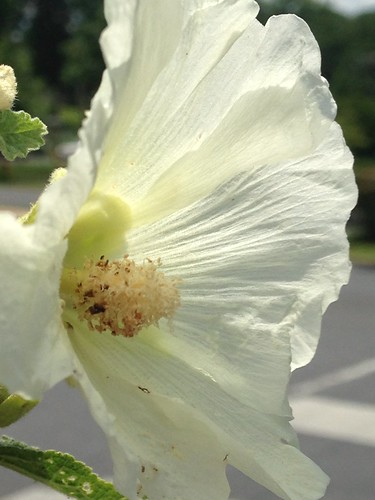
White Hollyhock, Springhill Road. Photo by Bob Kirchman
Everyone must leave something behind when he dies, my grandfather said. A child or a book or a painting or a house or a wall built or a pair of shoes made. Or a garden planted. Something your hand touched some way so your soul has somewhere to go when you die, and when people look at that tree or that flower you planted, you're there. It doesn't matter what you do, he said, so long as you change something from the way it was before you touched it into something that's like you after you take your hands away. The difference between the man who just cuts lawns and a real gardener is in the touching, he said. The lawn-cutter might just as well not have been there at all; the gardener will be there a lifetime." – Ray Bradbury, Fahrenheit 451
Passing something along to the generations to follow... a worthy ambition, indeed the great feast of Passover and the celebration of Purim involve the passing down of the great stories of Redemption! "And ye shall observe this thing for an ordinance to thee and to thy sons for ever. And it shall come to pass, when ye be come to the land which the Lord will give you, according as he hath promised, that ye shall keep this service. And it shall come to pass, when your children shall say unto you, What mean ye by this service? That ye shall say, It is the sacrifice of the Lord's passover, who passed over the houses of the children of Israel in Egypt, when he smote the Egyptians, and delivered our houses. And the people bowed the head and worshipped." -- Exodus 12:24-27
The celebration of Passover is a way of keeping the story alive. For generations this story told as a meal has given new generations the cherished history of their redemption. Indeed it should serve as a model for us as we pass down a Legacy of faith to our children. Historically we have passed along so much more to our children as we would teach them how to work, how to build a life and so much more. Of late our society has built a reliance on 'experts' to prepare our young people for the future. While I would readily agree that a young person becoming a doctor needs to be trained by other doctors, there is much to be learned outside of the academy from the proceeding generations of one's own family. Most of our work ethic and our character is formed in the home. There is much wisdom of a deeper sort to be found there.
Indeed, modern generations seem to have diminished the importance of this tradition, as referenced here in some of my writing: "Haroset, bitter herbs and young lamb mingled together to add illustration to an old story. In ancient times a covenant was often made within the context of a meal. Rupert's own redemptive story was now unmistakably flavored by sweet tea and macaroni and cheese. In the 1950's the American company Swanson created an invention known as the "TV Dinner." Families no longer conversed around the table, often "watching the news" instead of passing truth from generation to generation. Food was placed into individual compartments in a small aluminum tray, individualized for each diner. There were no more passed dishes. The family ate in silence as the television did all the talking."[1.]
That is why I love Mrs. Landes' Hollyhocks. They represent the passing down of a gift to bless many generations to come. The house is gone now, replaced by a gas station, but the Great-great grandchildren of Mrs. Landes still enjoy the fact that they still bloom every year where her house once stood and that is a wonderful thing!
I first noticed the wonderful hollyhocks as I would drive over to my weekend job with organ builder Xaver Wilhelmy. There they were growing in the highway right of way. I started photographing them, marveling at their tenacity in growing where they did. One day I mentioned them to my assistant Kristina, who surprised me by telling me that her Great-great Grandmother had first planted them. They too would find their way into story: "The hollyhocks were in bloom now, and their offspring, lovingly sown from Kris' pods, blessed many a neighboring garden in the biosphere which protected the little town from the ravages of the severe climate. Today, the little gardens seemed especially alive as hummingbirds and butterflies seemed to abound. "Why does this day seem so different from any other?" mused Kris. Surely it had to be the special visit from Kate and Elizabeth. No, the light seemed more brilliant. The flowers seemed more defined. An artist noticed things like this, and each of these women was an artist in her own right." [2.]
The statement: "Why does this day seem so different from any other?" alludes to the Seder by design, referring to the child's question which prefaces the great retelling of the great story of redemption. Projecting the great story into the future is a direct reference to the hope we have in our own promised redemption! Indeed that hope is at the heart of the celebration of Redemption and resurrection!
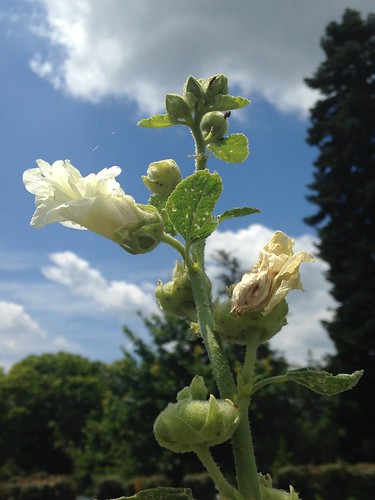
White Hollyhock, Springhill Road. Photo by Bob Kirchman
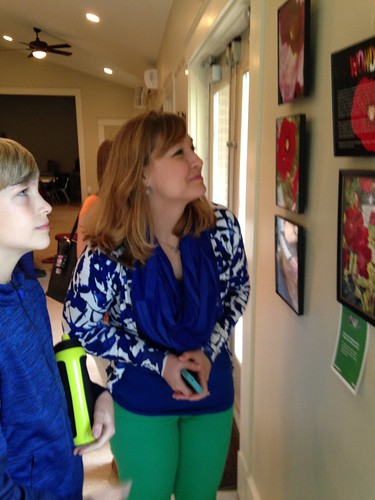
The Great-great Grandchildren of Mrs. Landes and the story of her legacy of hollyhocks. Her hollyhocks still bloom every Summer on Springhill Road in Staunton, Virginia. Her house is long gone, replaced by a gas station but the flowers continue to bless those who pass that way. They were the inspiration for the mural: Heavenly Hollyhocks that Mr. Kirchman painted in Charlottesville, Virginia.



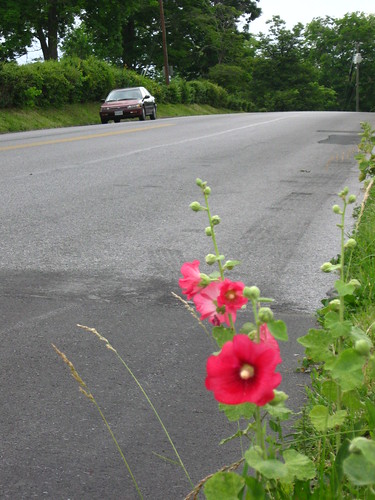

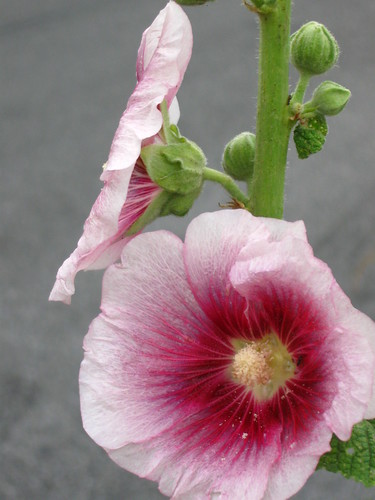
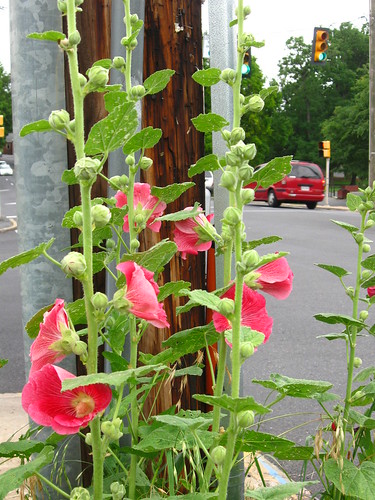
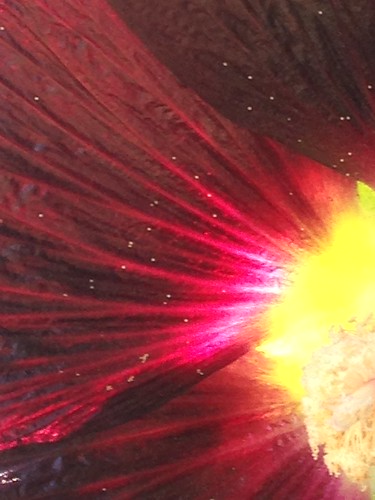



Every Summer they appear!, remnants of a garden planted long ago that continue to brighten the drive into Staunton along Churchville Avenue. What a great living legacy for a gardener!Photos by Bob Kirchman
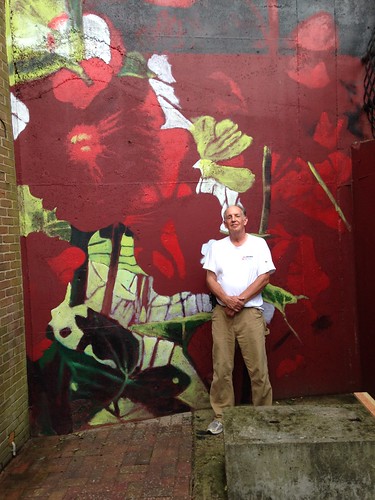
Mural inspired by the Springhill Hollyhocks.
Joseph Bryan Park Azaleas
Richmond, Virginia
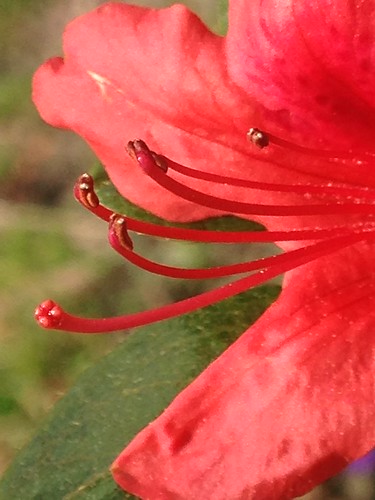
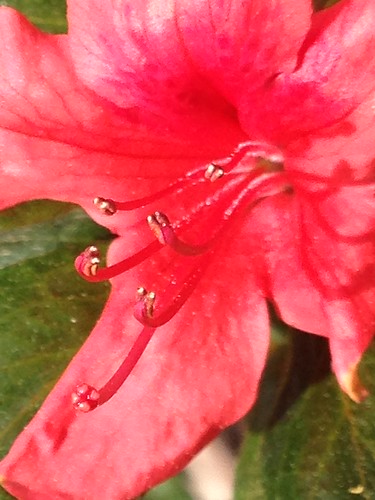
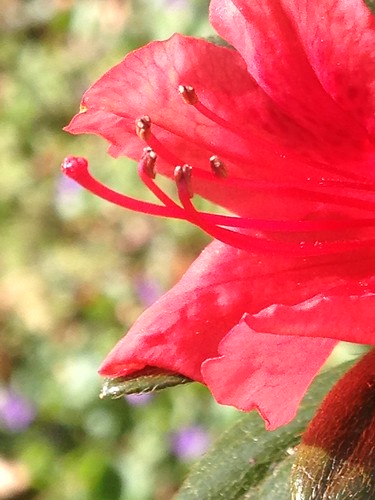
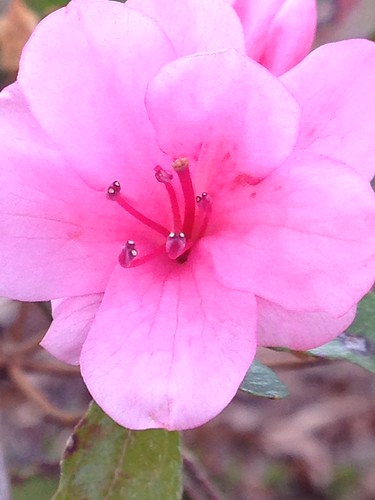
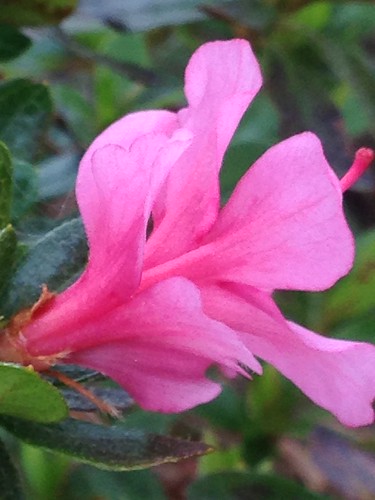
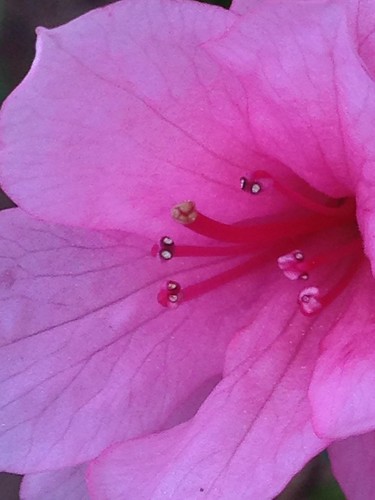
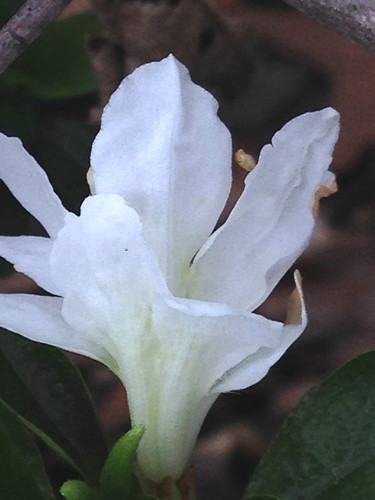
Photos by Bob Kirchman.
The Azalea Garden
[click to read]
The Azalea Garden was started in 1952 by Mr. Robert E. Harvey, a former Richmond Recreation and Parks Superintendent of Grounds and Structures. Over an almost fifteen-year span, Mr. Harvey, helpers from the City, Garden Clubs and volunteers planted 450,000 azaleas (50 different varieties) in approximately 76 separate beds. They also built a small pond with a stone fountain, and planted a large red and white cross made of azaleas, framed by boxwoods started from slips from boxwoods at Dogwood Dell. Eventually, these 17 acres of Bryan Park would be recognized as a major tourist attraction (and money generator), bringing 450,000 visitors per year to Bryan Park.
Unfortunately as Richmond, like many cities across the United States, came under financial strain, the Azalea Garden fell into disrepair. Efforts are slowly being made to bring it back to its former glory. (read more)
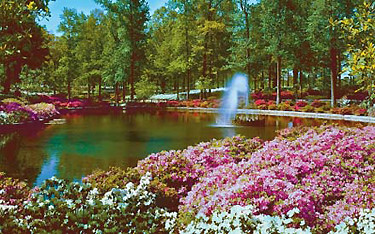
The Bryan Park Azalea Garden at the height of its glory.
Friends of Bryan Park.
Azalea Dew
Photo by Bob Kirchman
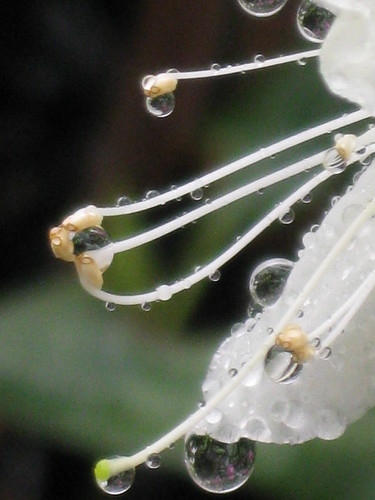
Drops on an azalea blossom create a vision of a magical world.
Photo by Bob Kirchman.
Public Service as a Holy Calling
The Life of William Wilberforce
Is it not the great end of religion, and, in particular, the glory of Christianity, to extinguish the malignant passions; to curb the violence, to control the appetites, and to smooth the asperities of man; to make us compassionate and kind, and forgiving one to another; to make us good husbands, good fathers, good friends; and to render us active and useful in the discharge of the relative social and civil duties?” – William Wilberforce
Men of authority and influence may promote good morals. Let them in their several stations encourage virtue . . . let them favor and take part in any plans which may be formed for the advancement of morality.” – William Wilberforce
It is indeed a most lamentable consequence of the practice of regarding religion as a compilation of statutes, and not as an internal principle, that it soon comes to be considered as being conversant about external actions rather than about habits of mind. This sentiment sometimes has even the hardiness to insinuate and maintain itself under the guise of extraordinary concern for practical religion; but it soon discovers the falsehood of this pretension, and betrays its real nature. The expedient, indeed, of attaining to superiority in practice by not wasting any of the attention on the internal principles from which alone practice can flow, is about as reasonable, and will answer about as well, as the economy of an architect who should account it mere prodigality to expend any of his materials in laying foundation, from an idea that they might be more usefully applied to the raising of the superstructure. We know what would be the fate of such an edifice.” – William Wilberforce
One often hears a nostalgic reference to “the Good Old Days” referring to times when culture seemed more civil, art was more uplifting and the times themselves had a more positive spirit. We do well to remember that these times of refreshment in a national culture are indeed the work of people like Wilberforce, who acted out of what had happened in their own spirit. They are often countered by an argument from those who desire a secular morality that “the good old days were not so good.” Indeed they can point to the fact that people would ostensibly be churchgoing but would still support slavery and such. Indeed one needs to look deeper to see that a Christianity that had a deeper hold on her practitioners was what eventually toppled slavery. In his book Under the Influence, [2.] Alvin Schmidt presents solid evidence of “How Christianity Changed the World.” One might be tempted to dismiss this work, in spite of all the evidence, as merely a tract to promote Faith, but consider the arguments of Dr. Theodore Dalrymple, an avowed atheist, who wrote the book Our Culture, What’s Left of It. [3.] Dalrymple, seeking reasons for the decline of Britain’s culture, finds like Schmidt that “Religion can be a force for good.” As Christianity has declined in Britain, so has the morality and overall state of the nation. Here Wilberforce’s thoughts on foundations apply. It is not enough to reinstate a ‘civil morality’ through preaching the law without its underlying spirit. The message of Jesus Christ cuts to the heart of man, addressing the sin itself, that’s effects are degradation and destruction.
Lovely flowers are the smiles of God's goodness.” -- William Wilberforce
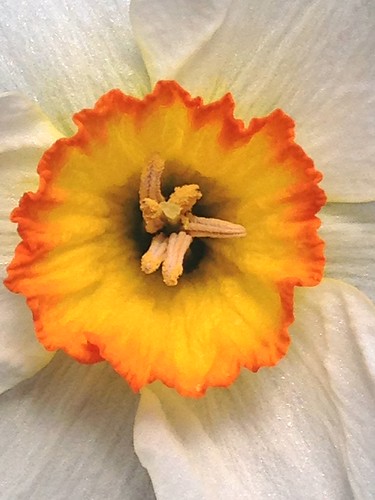
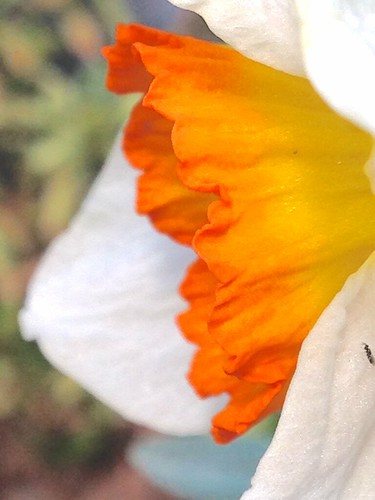
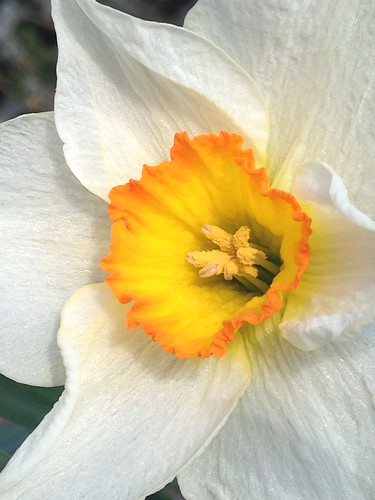
Jonquil. Photos by Bob Kirchman
The Two Voices
Reflections on Faith
[click to read]
In the movie: “The Longest Day,” which tells the story of Operation Overlord, the D-Day invasion of Normandy, John Wayne plays Lt. Col. Benjamin Vandervoort, commander of the 89th Division. There is a moment when he comes upon a road sign pointing out the direction to St. Mere Eglise, their objective. His men have already dutifully began to march in that direction.
Suddenly the General calls out: “Am I the only one in this unit that uses a compass?”
It turns out that the enemy has turned the sign around to lead them the wrong way! Vandervoort orders his men to turn around. He glances toward the sign: “Knock it Down!” he orders. And so we consider the voices that speak to us… offering to direct us, in our own day and time. How do we know which signs are right? What ‘compass’ is there to guide us? Are there signs around us that we should knock down? (read more)
Mountain Maple Blossoms
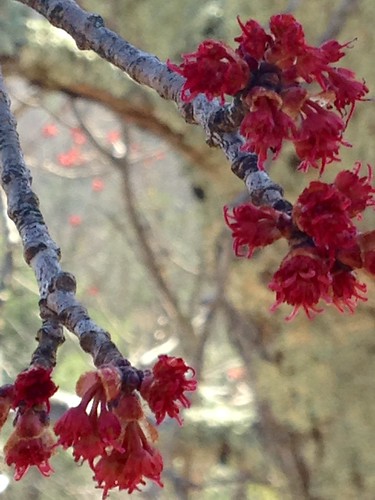
Maple Blossoms in the Blue Ridge Mountains. Photo by Bob Kirchman.
Monet Moments
Photographs by Bob Kirchman

Mary Gray Mountain, Staunton, Virginia. Photo by Bob Kirchman.
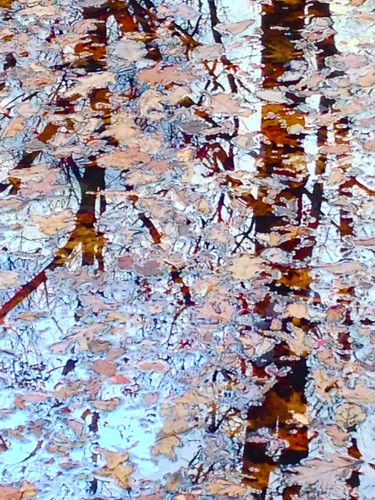
Sherando Lake, Augusta County, Virginia. Photo by Bob Kirchman.
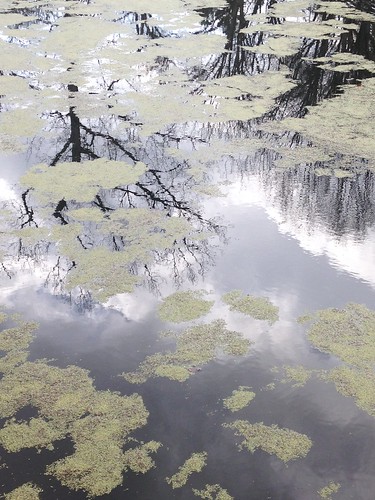
Joseph Bryan Park, Richmond, Virginia. Photo by Bob Kirchman.
